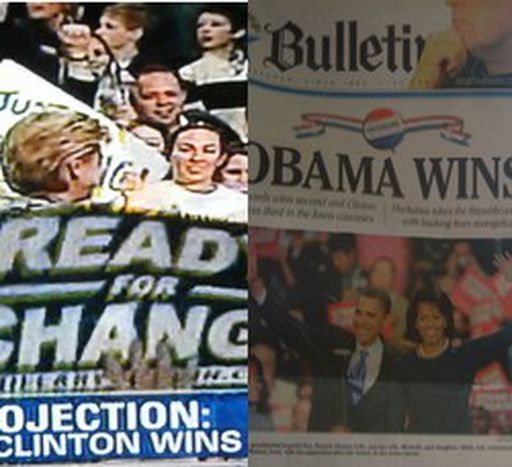
Super Stupid Tuesday
Published on
On Tuesday 5 February, 24 US states will hold their primaries or caucuses on a single day. But does the current nomination process facilitate the nomination of the best candidates?
8 January. The US states of Iowa and New Hampshire are first to vote in nominations for the 2008 US presidential elections. Mike Huckabee and Barack Obama win in Iowa, and Hillary Clinton and John McCain win in New Hampshire for the Republican and Democrat parties respectively.
But in the aftermath, many Americans began to question the nominating process itself. According to a survey conducted for The Associated Press and Yahoo News, fewer than one in five voters favour Iowa and New Hampshire’s ‘favoured state’ status. Are two tiny rural states really the place to kick off an all-important national selection process?
States leap frog
Officials in other states fear that if they hold their presidential primaries too late, the nominations will already have been decided and will become irrelevant. That has led states to leap-frog each other to go first.
The result: a colossal spasm of absurdity known as Super Duper Tuesday. On Tuesday 5 February, a total of 24 states will hold their primaries or caucuses on a single day. These include large states such as California, New York, Illinois, Georgia and New Jersey. These two dozen states hold enough delegates to nearly decide the presidential nomination all by themselves.
Having a single primary day with so many states should be called Super Stupid Tuesday. Those candidates with the most campaign cash and name recognition can compete in so many states simultaneously. It creates a virtual wealth primary in which new presidential faces will be quickly eliminated.
States with primaries after February 5 — including Texas, Ohio, Pennsylvania, Indiana, North Carolina and Virginia — may find that the nomination is already over before they even have a chance to vote. The mere possibility will lead some of those states to leapfrog in the 2012 presidential election, continuing the anarchy.
’National plan’ vs ‘current anarchy’: let all 50 states vote fairly
More and more people realise that the current system is utterly broken. There is a better way that would allow the maximum number of states — little states, big states and medium-sized states — to be relevant to the presidential nomination process.
A national plan would establish a total of four primary days, each held a month apart. Group the states into four clusters, by population. The smallest 12 states, plus federal territories (such as Puerto Rico, American Samoa, Guam and the US Virgin Islands - ndr) and Washington DC, would vote first, followed by the next smallest 13 states, then the 13 medium-sized states, and finally the 12 largest states. These four primaries would begin in March and end in June.
This national plan has a number of advantages over the current anarchy. First, by starting with small states and moving on to ever larger ones, it gives all states an influential role and allows more voters an effective voice. Big states would vote last, but since they hold the most delegates, nominations wouldn’t be decided until the final day.
Second, it accomplishes the recommendation of the ‘Vanishing Voter Project’ at Harvard’s Kennedy School of Government. In other words, the nominating process should ‘remain competitive for a longer period of time to give the public a greater opportunity to engage the campaign and become informed about the candidates.’ It also creates a shorter interval between the primary season and the nominating conventions in the summer, helping to sustain the public’s level of engagement.
Finally, a national plan preserves door-to-door ‘retail politicking’ in small states early in the season. It gives lesser-known or under-funded candidates a chance to catch fire. Late blooming candidates would have a chance to bounce back from early defeats.
In 2000 the Republican National Committee nearly adopted just such a plan. Pity; it would have led us out of the current morass. Both major parties should put in place a nationally coordinated presidential primary plan by 2012. The nomination of our nation’s chief executive is too important to leave to such a chaotic, state-by-state process.
The author is director of the Political Reform Program of the New America Foundation and author of ‘10 Steps to Repair American Democracy’
Compare Obama and Clinton's Iowa caucus and New Hampshire primary victory speeches
Videos: (llamomanu/ obededomj/ Youtube)
Click here to debate on the following topic in cafebabel.com's forum:
If you had the right to vote in the 2008 US elections, who would you vote for?
Debate with cafebabel.com on our blog:
'Barack Obama is not black!!!'



